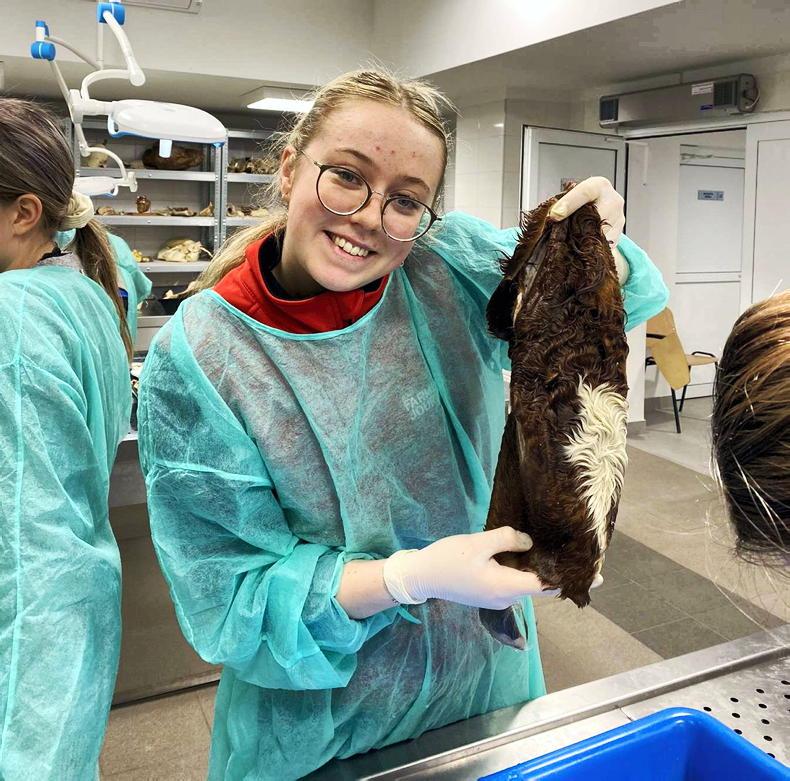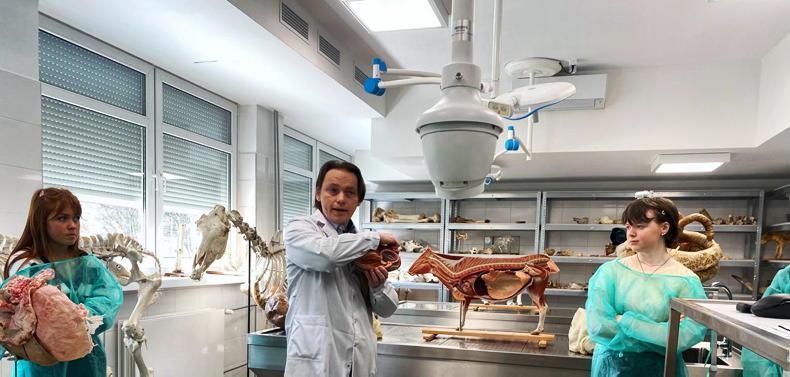There are currently more Irish students studying veterinary medicine abroad than there are in Ireland. Around 450 studnets are currently enrolled in courses in Poland. The main reason for this is due to the current offering of veterinary places in Ireland not meeting the demand.
Just over 40 places were available in UCD this academic year to Irish students, with another 40-odd places retained for international students, most of whom are American.
This is why you hear of so many Irish vets graduating from universities in Poland or Hungary.
In this two-part series, we will give some insight into the three veterinary medicine colleges in Poland which offer places to Irish students.
Olsztyn
This is the first year Irish students will study at the University of Warmia and Mazury Olsztyn. Before now, this university only offered a veterinary medicine degree through Polish.
This university is the most rural of the three veterinary colleges in Poland and is located right in the middle of Poland’s agricultural region.
It has 57 years of experience in teaching veterinary medicine – the faculty was established in 1966.
In October 2023, its new course started with one group of 12 students studying veterinary medicine through English, six of whom were Irish students.
Olsztyn is the only veterinary faculty in Poland that has a mobile clinic for farm animals and horses, and students are involved in the working of this clinic.
Having chosen Olstyn as her place of study, Cadhla Shanahan from Toomevara in Co Tipperary said that despite being nervous to be part of the first group of Irish students to study there, she was excited for the experience, particularly with large animals, that the course would bring.
In contrast, the other two colleges in Poland – Warsaw and Wroclaw – have well-established groups of Irish students studying there.
“The university of Warmia and Mazury Olsztyn really caught my eye when I heard about its achievements. It’s the highest ranked veterinary university in Poland. It also has great access to larger animals, which was an important factor for me when I was applying.
“As well, it’s the only university in the world which has access to a 24/7 mobile animal clinic,” Cadhla said.
Application process
“To get into the course in Olsztyn, I contacted Medical Poland, who are an application support service company to universities in Poland, and they gave me details about the application process.
“I did the whole application process through Medical Poland, which was a great help. The first thing I had to do were diagnostic tests in chemistry and biology and I did a mock interview with the team at Medical Poland to prepare myself for the real interview.
“Then to get in I did a 15-minute online interview, with a panel of professors from the university and Adam Krawczyk from Medical Poland was also present.
“I was tested on my knowledge of chemistry and biology, and I was also asked what my motivations to study veterinary medicine were. Prior to the interview I had provided a personal statement of about a page long which included my experience and motivations and skills. After the interview I was given a provisional place in the course, and once I uploaded my Leaving Cert results my place was finalised,” she said.

Cadhla Shanahan studying veterinary medicine at Olsztyn University Poland.
Academic year
The academic year in Poland starts in October and ends at the end of June. The winter semester lasts from October to February and the summer semester lasts from February to June.
At the end of each semester, students have final exams in the subjects they will no longer be taking.
“I had biology, chemistry, biophysics, and cell biology final exams at the end of my first semester, but I also studied anatomy and histology, but did not have final exams in these subjects because they were continuing on into the second semester,” Cadhla said.
Students also have continuous assessments in each subject. If good grades are achieved in these partial exams, they may be exempt from final exams and will pass the subject without taking a final exam.
Placement
“I will not officially be on placement until third year, the first two years of this course are mostly theory-based, as we need to build a decent amount of knowledge before heading out on placement.
“We can organise our own work experience over our summer holidays at home in Ireland to gain more hands-on experience if we want.
“We also have the opportunity to do Erasmus, which Irish students studying in Poland can do at home in Ireland,” Cadhla added.
College fees
College fees per semester are approximately €4,500, which works out at €9,000 per year.
The cost of living in Poland is also relatively cheap and accommodation in the dormitories is about €140 per month.
“Living in dorms, especially in first year, allows us to make new friends, but we also do not have to worry about any other bills, and we are guaranteed free Wi-Fi, hot water, and nice warm rooms.
“I am really enjoying my time here and I’d encourage anyone who wants to study veterinary medicine to consider Olsztyn as one of their choices,” Cadhla added.
Irish system
The current system in Ireland, Cadhla said, is not fair in terms of the number of places available for vet students.
“First of all, the points are ridiculously high for veterinary at home, which is obviously linked to the scarcity of places.
“There is definitely a need for a second vet school in Ireland, to give more people the opportunity to study veterinary, especially with the shortage of vets, in particular large animal vets in Ireland.
“I think the application process should be similar to Polish universities, who just focus on the important subjects that relate to the course and not overall results,” she said.

University of Warmia and Mazury in Olsztyn
Other colleges
Next week, we will take a look at the other two vet colleges in Poland, which have a significantly higher number of Irish students studying veterinary medicine.
One of these colleges is Warsaw university, which has the largest cohort of Irish students studying in Poland.
New vet school
Ireland has only one veterinary medicine course in UCD, with just over 40 places available in each academic year.
The University of Limerick (UL), Atlantic Technological University (ATU), South East Technological University (SETU) and University College Dublin (UCD) have all been shortlisted to deliver new or expanded veterinary medicine courses in order to deal with the demand.
All four universities have been deemed viable options to host a new vet school, however a decision on which college will be given the green light to run the new course has yet to be agreed.
There are currently more Irish students studying veterinary medicine abroad than there are in Ireland. Around 450 studnets are currently enrolled in courses in Poland. The main reason for this is due to the current offering of veterinary places in Ireland not meeting the demand.
Just over 40 places were available in UCD this academic year to Irish students, with another 40-odd places retained for international students, most of whom are American.
This is why you hear of so many Irish vets graduating from universities in Poland or Hungary.
In this two-part series, we will give some insight into the three veterinary medicine colleges in Poland which offer places to Irish students.
Olsztyn
This is the first year Irish students will study at the University of Warmia and Mazury Olsztyn. Before now, this university only offered a veterinary medicine degree through Polish.
This university is the most rural of the three veterinary colleges in Poland and is located right in the middle of Poland’s agricultural region.
It has 57 years of experience in teaching veterinary medicine – the faculty was established in 1966.
In October 2023, its new course started with one group of 12 students studying veterinary medicine through English, six of whom were Irish students.
Olsztyn is the only veterinary faculty in Poland that has a mobile clinic for farm animals and horses, and students are involved in the working of this clinic.
Having chosen Olstyn as her place of study, Cadhla Shanahan from Toomevara in Co Tipperary said that despite being nervous to be part of the first group of Irish students to study there, she was excited for the experience, particularly with large animals, that the course would bring.
In contrast, the other two colleges in Poland – Warsaw and Wroclaw – have well-established groups of Irish students studying there.
“The university of Warmia and Mazury Olsztyn really caught my eye when I heard about its achievements. It’s the highest ranked veterinary university in Poland. It also has great access to larger animals, which was an important factor for me when I was applying.
“As well, it’s the only university in the world which has access to a 24/7 mobile animal clinic,” Cadhla said.
Application process
“To get into the course in Olsztyn, I contacted Medical Poland, who are an application support service company to universities in Poland, and they gave me details about the application process.
“I did the whole application process through Medical Poland, which was a great help. The first thing I had to do were diagnostic tests in chemistry and biology and I did a mock interview with the team at Medical Poland to prepare myself for the real interview.
“Then to get in I did a 15-minute online interview, with a panel of professors from the university and Adam Krawczyk from Medical Poland was also present.
“I was tested on my knowledge of chemistry and biology, and I was also asked what my motivations to study veterinary medicine were. Prior to the interview I had provided a personal statement of about a page long which included my experience and motivations and skills. After the interview I was given a provisional place in the course, and once I uploaded my Leaving Cert results my place was finalised,” she said.

Cadhla Shanahan studying veterinary medicine at Olsztyn University Poland.
Academic year
The academic year in Poland starts in October and ends at the end of June. The winter semester lasts from October to February and the summer semester lasts from February to June.
At the end of each semester, students have final exams in the subjects they will no longer be taking.
“I had biology, chemistry, biophysics, and cell biology final exams at the end of my first semester, but I also studied anatomy and histology, but did not have final exams in these subjects because they were continuing on into the second semester,” Cadhla said.
Students also have continuous assessments in each subject. If good grades are achieved in these partial exams, they may be exempt from final exams and will pass the subject without taking a final exam.
Placement
“I will not officially be on placement until third year, the first two years of this course are mostly theory-based, as we need to build a decent amount of knowledge before heading out on placement.
“We can organise our own work experience over our summer holidays at home in Ireland to gain more hands-on experience if we want.
“We also have the opportunity to do Erasmus, which Irish students studying in Poland can do at home in Ireland,” Cadhla added.
College fees
College fees per semester are approximately €4,500, which works out at €9,000 per year.
The cost of living in Poland is also relatively cheap and accommodation in the dormitories is about €140 per month.
“Living in dorms, especially in first year, allows us to make new friends, but we also do not have to worry about any other bills, and we are guaranteed free Wi-Fi, hot water, and nice warm rooms.
“I am really enjoying my time here and I’d encourage anyone who wants to study veterinary medicine to consider Olsztyn as one of their choices,” Cadhla added.
Irish system
The current system in Ireland, Cadhla said, is not fair in terms of the number of places available for vet students.
“First of all, the points are ridiculously high for veterinary at home, which is obviously linked to the scarcity of places.
“There is definitely a need for a second vet school in Ireland, to give more people the opportunity to study veterinary, especially with the shortage of vets, in particular large animal vets in Ireland.
“I think the application process should be similar to Polish universities, who just focus on the important subjects that relate to the course and not overall results,” she said.

University of Warmia and Mazury in Olsztyn
Other colleges
Next week, we will take a look at the other two vet colleges in Poland, which have a significantly higher number of Irish students studying veterinary medicine.
One of these colleges is Warsaw university, which has the largest cohort of Irish students studying in Poland.
New vet school
Ireland has only one veterinary medicine course in UCD, with just over 40 places available in each academic year.
The University of Limerick (UL), Atlantic Technological University (ATU), South East Technological University (SETU) and University College Dublin (UCD) have all been shortlisted to deliver new or expanded veterinary medicine courses in order to deal with the demand.
All four universities have been deemed viable options to host a new vet school, however a decision on which college will be given the green light to run the new course has yet to be agreed.








 This is a subscriber-only article
This is a subscriber-only article










SHARING OPTIONS: